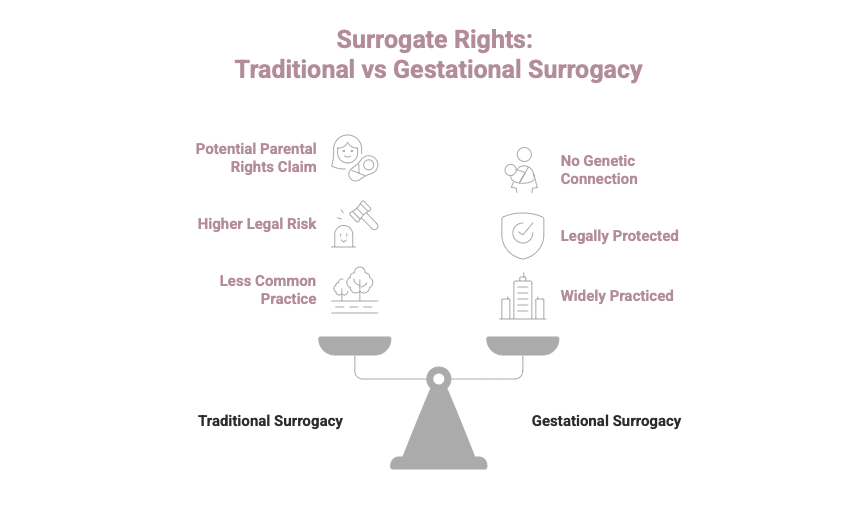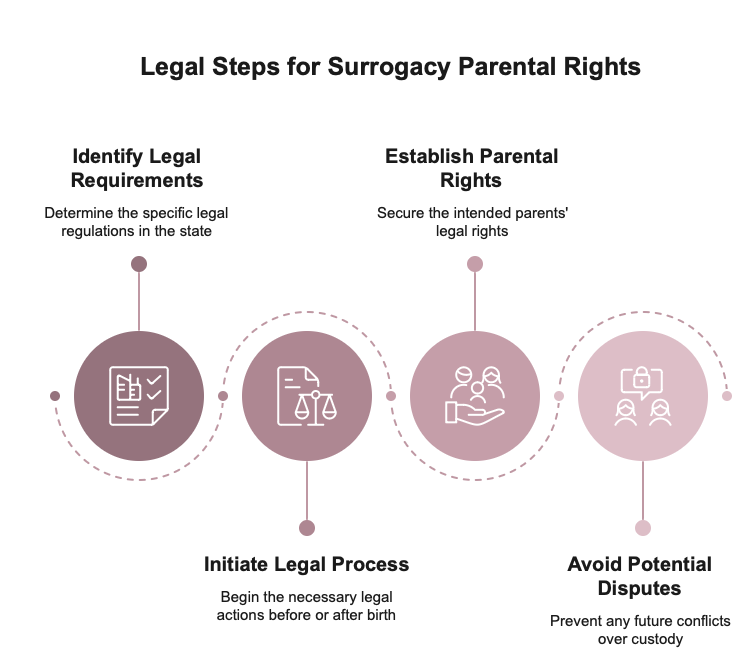This is one of the most common and emotionally charged questions from intended parents beginning their surrogacy journey. It’s completely natural to wonder what legal rights a surrogate has, especially when you’re placing your hopes, trust, and future family in someone else’s care. These concerns stem from love, protection, and the desire for certainty in what can feel like an uncertain process.
The short and reassuring answer is
no, gestational surrogates do not have parental rights to the child they carry.
Because they are not biologically related to the baby and contribute no genetic material, their role is to support the pregnancy and help bring the intended parents’ child into the world. That said, the legal process surrounding surrogacy and the establishment of parental rights can vary significantly by state. Understanding the laws and securing the proper legal agreements is key to ensuring a smooth and protected path to parenthood.
Surrogate Rights depend on the type of surrogacy arrangement.
In the United States, surrogacy laws vary by state, so legal protections depend on the State and the type of surrogacy arrangement. This blog will break down how parental rights work in surrogacy, what legal safeguards are in place, and what future surrogates should know before beginning their journey.
Parental Rights: Traditional vs. Gestational Surrogacy

Surrogacy arrangements can be categorized into two types: traditional surrogacy and gestational surrogacy. Understanding the difference is crucial when discussing surrogate parental rights.
Traditional Surrogacy
- In traditional surrogacy, the surrogate uses her own egg and is artificially inseminated with the intended father’s sperm or donor sperm.
- Because she is biologically related to the baby, traditional surrogacy can create legal complications regarding parental rights.
- Some states allow a traditional surrogate to claim parental rights if she changes her mind, leading to potential custody disputes.
- Due to these challenges, traditional surrogacy is far less common and legally riskier.
Gestational Surrogacy
- In gestational surrogacy, the surrogate carries an embryo created using the egg and sperm of the intended parents or donors.
- The surrogate has no genetic connection to the baby, which simplifies legal matters.
- This form of surrogacy is the most widely practiced and legally protected in the United States.
- In most cases, gestational surrogates do not have parental rights, thanks to legal agreements and court orders.
Gestational Surrogacy and Parental Rights
- In most states where surrogacy is legally recognized, intended parents are listed on the birth certificate, ensuring that the surrogate has no legal responsibility for the child.
- Surrogacy contracts are legally binding in many states, preventing any parental claims from the surrogate.
- Courts typically issue pre-birth or post-birth orders that transfer legal rights to the intended parents before or immediately after the baby is born.
Traditional Surrogacy and Legal Risks
- Since the surrogate is biologically related to the baby, she may have parental rights depending on state laws.
- If a traditional surrogate changes her mind, a legal process may be required to determine custody, making this type of surrogacy more complicated and emotionally challenging.
The Role of Surrogacy Contracts in Gestational Surrogacy
A well-drafted surrogacy contract is the foundation of a legally secure surrogacy journey. Before the embryo transfer, both the surrogate and intended parents must sign a legally binding contract that outlines:
- The surrogate’s agreement to carry the baby but not claim parental rights.
- Compensation details and medical coverage for the surrogate.
- The intended parents’ commitment to taking full responsibility for the child after birth.
- Legal steps required to ensure parental rights are established before or shortly after delivery.
This contract protects both the surrogate and the intended parents, ensuring that everyone understands their rights and responsibilities.
State Laws and Surrogacy Parental Rights

Surrogacy laws are determined at the state level, meaning that legal protections vary depending on where the surrogacy takes place.
Surrogate-Friendly States
Some states fully recognize gestational surrogacy and provide legal protections for both surrogates and intended parents. These states allow pre-birth orders, making the intended parents the legal parents from birth. Examples include:
Restrictive States
Some states do not legally recognize surrogacy contracts, making the process riskier. In places like Michigan and Nebraska, compensated surrogacy is illegal, meaning surrogates in these states may have unintended parental rights or face legal challenges.
Because of these differences, it is essential for surrogates to work with experienced surrogacy attorneys to ensure compliance with state laws.
Looking for other states surrogacy law? Explore our U.S state-by-state surrogacy map.
Pre-Birth and Post-Birth Legal Processes
To ensure surrogates do not have parental rights, legal steps must be taken before or after birth, depending on the state.
Pre-Birth Orders
- In many states, intended parents can obtain a pre-birth order, which legally recognizes them as the parents before the baby is born.
- This order ensures that the baby is handed directly to the intended parents after birth, with no legal obligations for the surrogate.
Post-Birth Legal Processes
- In some states, intended parents must complete a legal process after birth, such as an adoption or court order, to establish their parental rights.
- While this process can take additional time, surrogacy contracts help ensure the surrogate has no unintended legal responsibilities.
Can Intended Parents Change Their Mind?
It’s extremely rare, but it’s a question worth asking, can intended parents change their mind after a surrogacy journey has begun? Legally speaking, once a contract is signed and parental rights are established (typically through a pre-birth or post-birth order), intended parents are bound by the agreement and cannot simply walk away. That said, surrogacy contracts are designed to anticipate even the most unlikely scenarios, including relationship breakdowns, changes in financial circumstances, or medical outcomes. This is why it’s essential to work with a surrogacy agency that requires comprehensive legal agreements upfront. These documents clearly outline each party’s obligations and ensure that, no matter what happens, the child has legal parents and the surrogate is fully protected.
What Happens If a Surrogate Changes Her Mind?
One of the biggest concerns for both surrogates and intended parents is what happens if a surrogate wants to keep the baby?
- In gestational surrogacy, a surrogate cannot claim parental rights if a legal contract and court orders are in place.
- In traditional surrogacy, the surrogate may have legal standing in some states, making it critical to seek legal guidance before pursuing this path.
- Thorough psychological screenings before pregnancy help ensure that surrogates are emotionally prepared for the process.
These legal safeguards are why working with a reputable surrogacy agency and an experienced attorney is so important.
Ensuring Legal Clarity for Surrogates
For women considering becoming surrogates, understanding parental rights is crucial to feeling secure in their decision. The good news is that in gestational surrogacy, surrogates do not have parental rights, and legal contracts protect all parties involved.
To ensure a smooth and legally protected surrogacy journey:
- Work with an experienced surrogacy attorney to understand state laws.
- Ensure a legally binding contract is in place before pregnancy.
- Choose a reputable surrogacy agency that prioritizes legal and emotional support.
Surrogacy is a selfless and life-changing gift, and knowing your legal rights provides peace of mind throughout the process. If you have any doubts or legal concerns, consult with a professional to ensure your surrogacy journey is legally sound and emotionally fulfilling.





